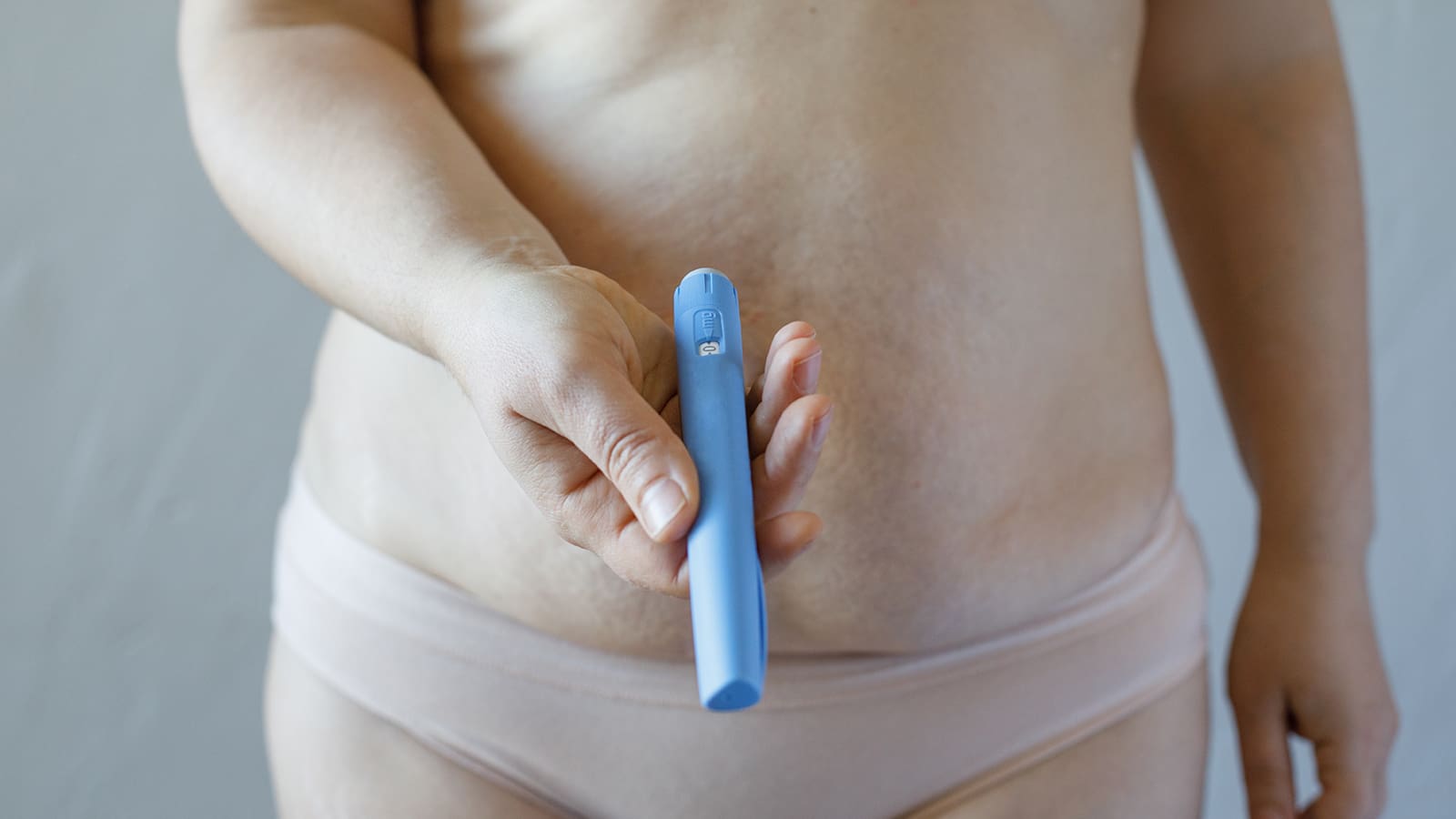Reviewed By Blake Gilliam, CRNP
Reading Time: 7 minutes
Semaglutide is a well-known weight loss medication that was originally developed to treat type 2 diabetes. However, it has recently gained popularity as a treatment for obesity.
While some people may experience significant weight loss while taking semaglutide, others may not see the same results.
If you are currently taking semaglutide and are not seeing the weight loss results you were expecting, you may be wondering: why am I not losing weight on semaglutide?
In this blog, we will discuss the possible reasons why and what you can do about it.
Table of Contents
Understanding Semaglutide and How it Works
Before we dive into the reasons why semaglutide may not be working for you, it is important to understand what this medication does and how it works.
Semaglutide belongs to a class of medications called glucagon-like peptide-1 (GLP-1) receptor agonists. These medications work by mimicking the actions of GLP-1, a hormone produced in the intestine that helps regulate blood sugar levels and promotes feelings of fullness.
By activating GLP-1 receptors, semaglutide can help decrease appetite, slow down stomach emptying, and increase insulin production. These effects can lead to reduced food intake, improved blood sugar control, and potentially weight loss.
The Crucial Role of Lifestyle Change
Semaglutide is most effective when combined with a complete lifestyle overhaul. This encompasses dietary adjustments, an increase in physical activity, and the adoption of healthy habits.
Without these lifestyle changes, it can be challenging to achieve significant weight loss while taking semaglutide. In fact, studies have shown that individuals who made no lifestyle changes while taking semaglutide experienced minimal weight loss compared to those who made healthy lifestyle choices.
Possible Reasons for Not Losing Weight on Semaglutide
Now, let’s explore the possible reasons why you may not be losing weight on semaglutide:
- Inadequate dosage: The recommended dosage of semaglutide for obesity treatment is 2.4 mg once weekly. If you are not taking the prescribed dose, it can affect the effectiveness of the medication.
- Insufficient lifestyle changes: As mentioned earlier, lifestyle changes play a crucial role in the success of semaglutide for weight loss. If you are not following a healthy diet and exercise routine, it will hinder your progress.
- Underlying medical conditions: Certain health conditions, such as hypothyroidism or polycystic ovary syndrome (PCOS), can impede weight loss efforts. These conditions may need to be addressed before seeing significant weight loss with semaglutide.
- Medication interactions: Semaglutide may interact with other medications you are taking, affecting its effectiveness. It is essential to inform your doctor about all the medications and supplements you are currently using.
Tips to Maximize Weight Loss on Semaglutide
If you are not losing weight on semaglutide, here are some tips that can help maximize the medication’s effectiveness.
Diet
Focus on consuming whole foods, lean proteins, fruits, vegetables, and healthy fats. Limit your intake of processed and high-calorie foods. Here are a few things to keep in mind:
- Reduce your calorie intake: To lose weight, you need to consume fewer calories than what your body burns.
- Keep track of your food intake: Maintaining a food diary or using a calorie tracking app can help you stay accountable and make better food choices.
- Don’t skip meals: Skipping meals can slow down your metabolism and make it harder to lose weight. Aim for three balanced meals and healthy snacks if needed.
- Monitor portion sizes: Even if you are eating healthy foods, consuming too much can hinder weight loss progress. Be mindful of your portion sizes and use measuring cups or a food scale if needed. Use the hand method to estimate portion sizes: one fist for vegetables, one palm for protein, one cupped hand for carbohydrates, and one thumb for fats.
- Eat from all food groups: Don’t eliminate entire food groups from your diet unless you are allergic, intolerant or advised to do so by a healthcare professional. All food groups provide essential nutrients, and a well-rounded diet is crucial for overall health.
- Avoid labeling food as good and bad: Instead, focus on the quality and quantity of your food intake. Allow yourself to indulge in moderation.
- Limit your alcohol consumption: Alcoholic beverages are high in calories and can hinder weight loss progress. It is best to limit or avoid alcohol while trying to lose weight.
What To Eat on Semaglutide for Weight Loss
Here are specific examples of foods you should incorporate into your diet for optimal results:
- Fruits and Vegetables: These are high in fiber, vitamins, and minerals while being low in calories. Focus on non-starchy vegetables like spinach, kale, bell peppers, and broccoli, and low-glycemic fruits such as berries, apples, and pears.
- Lean Proteins: Incorporate sources of lean protein to help maintain muscle mass while losing weight. Excellent options include chicken breast, turkey, fish (such as salmon and tuna for omega-3 fatty acids), legumes, and tofu.
- Whole Grains: Choose whole grains over refined grains for more nutrients and better blood sugar control. Quinoa, brown rice, oats, and whole-wheat products are great choices.
- Healthy Fats: Include sources of healthy fats in your diet, which can help keep you full and satisfied. Avocado, nuts, seeds, and olive oil are excellent sources.
- Low-fat dairy or plant-based alternatives: Opt for low-fat dairy products or unsweetened plant-based alternatives like almond milk, soy milk, or coconut yogurt. These can provide calcium and protein without excess calories or sugar.
Remember, while semaglutide can aid in weight loss by reducing appetite and improving satiety, combining it with a nutritious diet rich in whole foods will enhance your overall health and contribute to more sustainable weight loss.
Exercise
Incorporate regular exercise into your routine. Aim for at least 150 minutes of moderate-intensity physical activity or 75 minutes of vigorous exercise per week. Here are some tips:
- Find activities you enjoy: Engage in activities that you find enjoyable, whether it is walking, dancing, swimming, or playing a sport. This will make it easier to stick to a consistent exercise routine.
- Start slow: If you are new to exercise, start slowly and gradually increase the intensity and duration of your workouts.
- Mix it up: Vary your workouts to prevent boredom and challenge different muscle groups.
- Stay active throughout the day: In addition to structured exercise, find ways to stay active throughout the day, such as taking a walk during breaks at work or doing household chores.
- Work with a personal trainer: A personal trainer can help design a workout plan that meets your specific needs and goals. You are more likely to stick to an exercise routine when you have professional guidance and accountability.
- Prioritize strength training (resistance training): Building lean muscle mass through strength training can increase your metabolism and aid in weight loss.
Healthy Habits
Incorporate healthy habits into your daily routine to support weight loss:
- Get enough sleep: Poor sleep or lack of sleep can affect hormone levels, increase appetite, and lead to weight gain. Aim for 7–9 hours of quality sleep per night.
- Reduce stress: Chronic stress can lead to emotional eating and hinder weight loss. Find healthy ways to manage stress, such as meditation, exercise, or talking to a therapist.
- Stay hydrated: Drinking enough water can help control appetite and boost metabolism. Aim for at least 8 glasses of water per day.
- Be patient: Weight loss takes time, and it is essential to be patient with yourself. Focus on making sustainable lifestyle changes rather than quick fixes.
Madison Integrative Medicine: Your Partners in Weight Loss
While semaglutide is proven to be effective for weight loss, it may not work for everyone. To lose weight on semaglutide, you may need to make some significant lifestyle changes. We understand that weight loss is a complex journey and provide individualized support to help you achieve your goals.
Our team can work with you to develop a personalized weight loss plan that incorporates nutrition, exercise, and healthy habits. Contact us today to learn more about how we can support you on your weight loss journey. Together, we can help you achieve sustainable and long-term success in managing your weight for improved overall health and wellbeing.
If you are searching for ‘semaglutide for weight loss near me,’ call (256) 325-0955 to book an appointment or complete the online inquiry form.

